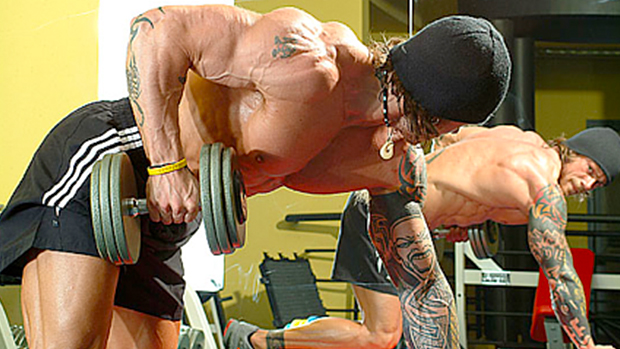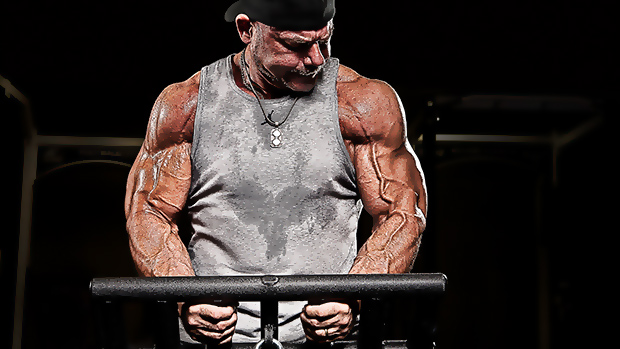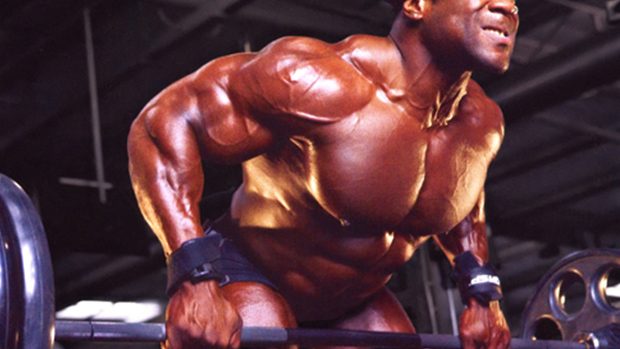It started in March 2005 with a forum thread titled "Grateful for Accomplishment". Since then, the Testosterone reader who goes by the handle of Caveman has become something of a local celebrity.
Why? Probably because he has the kind of physique that most Testosterone members would like to have. But how did he get it? How does he train and what does he eat? What role did steroids play in building that admirable physique?
We tracked the 34-year-old Caveman down to South America. Trained as a geologist, a profession he still pursues intermittently, he works as a trainer at a gym in Santiago, Chile, where he also runs a supplement shop. Although he asked us not to use his real name, the interview he gave us was frank and refreshingly bullshit-free.

T-Nation: How'd you get started in lifting?
Caveman: I was into sports starting at a young age. At five I was already trying tennis and very much into gymnastics. My family was very athletic. My grandpa, an immigrant from Croatia into south Chile, used to earn money by boxing. He was as strong as an ox, one of those no-neck, heavy-forearmed guys who could grab your head and crush it.
My dad started lifting at a young age, going by a Charles Atlas book. I've seen his steel shoes and all that. He was also into boxing. The first gift I remember was a couple of Marvin Hagler boxing gloves and a homemade chin-up bar.
The chin-up bar was noisy, so my dad expected to hear me perform three sets of fifteen reps each morning before school. At night, my brother and I would put on the gloves and beat the shit out of each other.
I practiced all kind of sports and excelled in gymnastics, going to a national tournament at the age of nine. I also played tennis seriously until age 17. I started lifting weights to be better at sports, and in college I started to focus on that.

It was then that I got a Spanish copy of Muscle & Fitness and started with that. I ate like an animal: rice, pasta, potatoes, mixed raw egg whites with my oatmeal … you name it, I did it. The only powder protein was an egg concentrate that was impossible to dissolve.
After college, in 1997, I came to Santiago, where the Internet was more easily available. I joined a good gym and realized what a wimp I was. My standard for "good" had to change. It wasn't good at all!
It wasn't until 2000, when I started reading Testosterone that I really started improving, first with training, then with my nutrition. In 2005 I started the "Grateful" thread. So when people ask me how much time it takes to get like this, I answer, "Well, about eight years of fucking up and four of applying all you've learned!"
T-Nation: You've obviously worked very hard in the gym and applied your nutritional knowledge, but let's be honest here – some steroid use was involved too, right? You've mentioned on our forums that you did at least one cycle. Why did you stop?
Caveman: Well, I haven't stopped. It's just that a few years back sources were much more trustworthy. These days down here you can get cooking oil in your vials, so it's not that encouraging. This year four bodybuilders died within seven days, one because of a stroke and the other three were using Dinitrophenol, a substance used to get extremely lean [that's also] found in rat poisons.
The first time I used basic stuff like Testosterone, Boldenone and Stanozolol. It worked great and I did, like, four weeks. Then, while traveling and living abroad, I never used a thing. Back home, and after reading a lot, I decided to try again with Trenbolone and Primobolan in the mix. That's when I was certain about the source.

I've never done more than two cycles a year and never for more than five weeks each. For bulking, the steroids help me to bulk leaner. They're not really worth it if you don't make a living out of this.
On the other hand, I think that they're a great help to avoid any muscle loss when leaning. You see a lot of skinny ripped guys and also huge monsters in the gyms. The first lack quality mass, and the others have the definition of a dolphin. What's hard is getting size, muscularity, and definition. That's where steroids play a bigger role.
You don't see many big and ripped guys around. And if you do see them – at the risk of sounding like a cynic – most of them are on steroids.
I'm totally pro-anabolic steroids; I think all tools available are fine. Just know what you're doing and don't use them to jump training and nutrition phases; that won't work in the long run. I can stop training for up to a month or so and lose almost no strength or size. Most of what I've got is mine, not on loan.
These days I still do two cycles a year, but they're three to four weeks long, something most guys don't understand and would laugh about. But this is what I've found to be effective for me and for my goals. Sure, if I wanted to weigh 260 I'd have to increase the length and amount used, but it's not what I'm looking for.
T-Nation: What does your wife think of your steroid use?
Caveman: Let's start by saying that I got married six months ago, after two years of dating and 10 years of knowing each other. Being in the same circles and knowing each other for that long, well, it's like we knew everything about each other, so it was never an issue.
She also lifts, although she doesn't love it like I do. We've talked about my steroid use and we share the same ideas. The one thing that really worries her is our future kids. Their health, and before that, getting pregnant and having a good pregnancy, is of first importance. This is one of the reasons for me to keep 'roids to a minimum while still getting the benefits. I have to stay healthy and functional.
On the other hand, my wife likes well-built bodies and envies a bit the fact that there's so much more stuff for guys than for women, and that the side effects are intensified or more noticeable for women.
T-Nation: You don't seem to care that you're talking about steroid use in an article that contains your photos. Aren't you worried about legal issues? Or at least worried that people may find out, like your father-in-law or your boss?
Caveman: I'm my own boss so that's not a problem. Steroids are still in a gray area of the law down here: not legal, but not illegal. Many of the big guys go to places like here to bulk; it's easier to focus on training if you don't have to worry about legal matters.
T-Nation: How easy is it to get steroids in Chile?
Caveman: Quite easy. There are no precise or established laws or criteria. Test and nandrolone are bought over the counter at any drugstore. You can get them cheaper in the black market but why risk it? Oral stanozolol you can have prepared at some drugstores with no prescription. HGH is also available at your local pharmacy.
All the other stuff comes from Argentina, Ecuador, Mexico, Peru, and Paraguay. You don't find much Eastern European or Asian gear, and most is counterfeit or fake. You find human and animal, real, fake, and counterfeit at lower doses. You can easily get ripped off.

T-Nation: What do you think you'd look like without steroids? In other words, how much of your physique can be credited to drug use?
Caveman: I guess somewhere in the neighborhood of 20 lean pounds are due to steroid use. I've been 200 to 205 pounds drug-free and looking good. Not rock-hard, but good.
Steroids are just a tool – a great tool – but you have to know what you're doing. If it was easy the streets would be packed full of 240-pound ripped guys, but you don't see many.
T-Nation: What was your physique like when you started bodybuilding?
Caveman: I was skinny. When I started lifting in college I was 160 pounds at 5'9". My idea of being fit was nothing like today. Hardness, vascularity, size, body-fat distribution ... I didn't have a clue about all that.
T-Nation: Have you ever competed in bodybuilding?
Caveman: I'm asked that a lot, but I've never seen myself as having enough size to be on a stage. I've always strived for a fit look, a bit bigger than usual, but focusing more on strength and performance.
At 220, I can do most of the things I used to do in gymnastics. I'm fast, have endurance, and my gymnastics background helps a lot. Athletically, I want to be able to do anything I want in the moment.
T-Nation: If you had to start over again in bodybuilding, what would you do differently?
Caveman: Wouldn't that take the fun out of it? I'm 34 and I feel great, so I haven't done that bad.
When I started 14 years ago, all I had was M&F, so I followed the most stupid advice, training and diet-wise. But constantly fucking up in the beginning, be it in weights, training, or nutrition, has helped me so much mentally that I've been able to go through tough times without being as affected as others.
T-Nation: What advice do you have for readers who are just starting out?
Caveman: You have to select your sources and choose whom to listen to. We aren't average people once you take bodybuilding for real. Don't expect that advice for Mrs. Jones is going to work for you.
Also, be flexible. If you plan something and it's not paying off, change it or drop it.
Finally, I never gave attention to nutrition until reading T-Nation. I had no sources. It made the biggest difference. I learned that it wasn't about depriving yourself of things. It's about making the right choices of food at the right times.
T-Nation: Do you prefer splits or full-body training?
Caveman: I like both and I alternate both. I mix reps, sets, exercises, and everything to keep my body guessing and my motivation high.
I learned not to do the same routine for more than six weeks. Since I'm training muscles, not precise exercises, I can change and replace similar exercises so my routine has the same features and complies with my goal without being the exact same every time I hit the gym.
I'd say I do split training 60 percent of the time and full-body 40 percent of the time. When I do body-part-split training, it's usually only a two-day split.
<!--  -->
-->
T-Nation: What lifts make up the core of your training programs?
Caveman: Squat, as my dad told me. If you could do only one thing it should be the squat. But then I met the snatch and its variations, deadlifts and variations, and always some presses for chest and shoulders. I like rows, too. I've gone through periods with no direct arm or any isolation movements.
T-Nation: What does your supplement program look like?
Caveman: Post-workout is always a shake with a 2:1 or 1:1 carb-to-protein ratio. I also use whey and casein. I drop the whey concentrate when leaning because of its high sodium content. I'd rather stick to slow-digesting casein for all my shakes. I don't use "weight gainers." I think eating carbs is much more satisfying than drinking them.
I firmly believe in creatine, and I use BCAAs, 15 to 20 grams a day, and also glutamine when I'm under maintenance calories, 10 grams a day in two doses.
When I'm under maintenance calories, or when my training frequency increases, I'll also use omega-3, MCT, CLA, and flax. ALA, I swear by this one, works wonders for me, but I have to take over 1,200 mg a day, and only when overfeeding and on my free days.
Sometimes I'll also take ECA before working out, and two more times a day when I'm leaning out, or when my mood isn't the best. I used to take prohormones too, but now there are none on the market down here. Lastly, tribulus and ZMA are two great things that I take 80 percent of the time. I only wish that Biotest stuff was more available down here.
T-Nation: How about diet? What's your general dieting or nutrition philosophy?
Caveman: Most days I have three protein shakes and three solid meals. I have daily logs of everything I ate for four years. That's every day and everything, and yes, you have to be a bit nuts. I made my own database and formulated an Excel spreadsheet that could calculate everything anytime I ate.
I try to stay lean all year. It helps that for some years I was spending winters in the US, where it was summer. So I was forced to be lean year around and I found it great, especially for my pocket: no bulk clothes, no lean clothes, just one size.
I think once you know yourself you can eat almost anything. That's obviously within some limits, but I really think it's all about timing. Insulin is the one to know and control. Nutrition is about the right choices at the right time. I really think T-Nation authors Berardi and Lowery are fundamental pillars to anyone who wants to nourish himself, not just eat.
Nowadays I eat 40 to 50 percent protein, 30 to 40 percent carbs, and 10 to 30 percent fat. One thing is for sure: I can't remember the last time I ate less than 250 grams a day of protein. Also, I always have a free day a week, and I mean free.
T-Nation: What do you think most struggling bodybuilders are overlooking or missing that's holding them back, aside from a couple of steroid cycles a year?
Caveman: I see many guys that get to the gym for the first time and start doing one-arm isolation curls. I think that good solid core muscles, the foundation, are one of the main things that bodybuilders lack these days.
You're only as strong as your weakest link. That's so important and so misunderstood. Force and power are generated in your legs and back. Your body isn't going to grow a 55-inch chest if your legs won't be able to handle it.
One other thing is nutrition. People don't really know what they eat. How can you improve your nutrition if you don't know where you stand now? Sometimes small changes in your diet will make a big difference, but people just don't see it.

T-Nation: What's your daily schedule like?
Caveman: I wake up and have a shake with milk and oatmeal as breakfast. I do think milk makes me look softer, but still, I just like it. I drop the milk when seriously leaning. I go to the gym, work with one or two trainees for two hours, and then do some HIIT – rope jumping, sprinting, throwing stuff, bodyweight exercises, etc. Thirty minutes, tops. When leaning, I do this before breakfast. I then have my midmorning meal and lunch.
Later, I work out for up to 60 minutes, usually 45, have my post-workout shake, and stay in the gym where my store is. After that I have my fifth meal, a shake, but this time more protein and less or no carbs in it. Then I go home, spend some time with my wife, and have dinner. This is what I do three or four days a week; other days I don't work out but try to do the HIIT.
One or two days a week I do no physical activity. One day is totally free from exercise and [programmed] diet. I just let go and rest both mind and body.
Lately I haven't done any geological work, meaning no hill or mountain climbing, and it reflects on my body fat percentage. Walking all day with a heavy backpack really helps you lean out.
T-Nation: What future goals do you have?
Caveman: I'm already 34; that's old for current sport standards, but I'd really love to help guys, friends, and my kids in the near future, to achieve something worthy of all the effort one has to put into this when being serious about it.
I'd like to work with people of any age that are willing to learn and will give to this sport the importance I give to it, nothing short of that. I've had to stop training people because their lack of commitment was starting to affect my mood and love for the gym.
Basically, I'm aiming to attach my life and career to training, helping, and coaching athletes and regular people, be it as a full-time job or in my free time. I also like studying, and that's one of the reasons I like T-Nation. There's so much information that it's hard to keep updated sometimes, covering all angles and topics of weightlifting and bodybuilding.

For me, I'm just trying to be the most efficient possible at this body weight. I've been heavier and I didn't feel good, so I'm just trying to look and perform the best at this weight.
There's always room for improvement, so I keep looking for my weak points and trying to fix them. I'm also paying more attention to mobility and flexibility. Sometimes I can really tell I'm not 20 anymore!
T-Nation: Thanks for the honest interview, Caveman.



